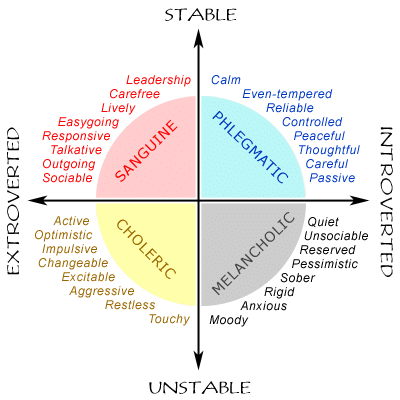When I received the SEO trends from the IT department today, I was intrigued to see that the term “phlegmatic temperament” was trending significantly. As someone with a Phlegmatic temperament, I felt an immediate connection and a desire to write about the topic. This took me back to a pivotal moment in my life when I was in Senior Secondary School. My sister’s friend lent me a book titled “Why You Act the Way You Do” by Tim LaHaye.
As an avid reader of motivational books, the title instantly grabbed my attention. I devoured the book in a few days, gaining invaluable insights into temperaments and finally agreeing with Tima Lahaye when he said “Understanding your temperament is the key to discovering your potential.” Before we proceed with the phlegmatic temperament, let’s know what a temperament is. Temperament pertains to an individual’s innate patterns of behavior, emotions, and reactions, shaped by both biological and environmental factors.

The phlegmatic temperament, one of the four temperaments described by ancient philosophers, represents a calm, reliable, and thoughtful personality. By recognizing and understanding the strengths and weaknesses of this temperament, individuals can achieve greater self-awareness and personal growth.
Furthermore, the phlegmatic temperament is characterised by a relaxed and peaceful demeanor. Phlegmatics often act as peacemakers, seeking harmony and avoiding conflict whenever possible. They are dependable, consistent, and patient, making them reliable friends and colleagues. However, people sometimes mistake their calm nature for laziness or lack of ambition.
Strengths of the Phlegmatic Temperament
Calmness Under Pressure: Phlegmatics remain composed even in stressful situations. Their ability to stay level-headed makes them excellent in crisis management roles.
Reliability: They are known for their dependability. Once committed to a task, phlegmatics will see it through to completion with consistent effort.
Empathy and Compassion: Phlegmatics are empathetic listeners and often provide a shoulder to lean on. Their compassionate nature helps them build strong, lasting relationships.
Peacemaking Abilities: Their natural inclination to avoid conflict makes phlegmatics excellent mediators. They can bring harmony to tense situations, fostering a peaceful environment.
Patience: Patience is a hallmark of the phlegmatic temperament. They wait for the right moment and do not let delays or obstacles easily frustrate them.
Weaknesses of the Phlegmatic Temperament
Indecisiveness: Phlegmatics can struggle with decision-making due to their desire to avoid conflict and please everyone.
Procrastination: Their calm nature sometimes leads to procrastination. They may delay tasks, especially those they find unpleasant or challenging.
Lack of Motivation: Phlegmatics might appear unmotivated or lazy because they are not driven by external rewards. They need to find personal significance in their activities.
Resistance to Change: They prefer routine and can be resistant to change, making it difficult for them to adapt to new situations.
Avoidance of Conflict: While their peacemaking is a strength, it can also be a weakness. Avoiding necessary confrontations can lead to unresolved issues.
In various fields in Nigeria, several prominent figures exhibit traits of the phlegmatic temperament. Former President Goodluck Jonathan demonstrates calm and composed leadership, reflecting patience and diplomacy. In football, Mikel John Obi’s steady and reliable presence on the field showcases his ability to maintain control under pressure. Fashion designer Deola Sagoe’s consistent creativity and calm approach to innovation highlight phlegmatic traits.
Abraham, Joseph, and Daniel each exemplify the phlegmatic temperament through their unwavering faith, calm demeanor, and reliability in the face of adversity. Abraham’s patience and steadfast belief in God’s promises showcase his phlegmatic nature, while Joseph’s ability to maintain composure and demonstrate forgiveness despite being sold into slavery underscores his phlegmatic traits, ultimately leading to his rise as a trusted advisor. Similarly, Daniel’s calm response to perilous situations like the lions’ den underscores his unwavering faith and reliability, further illustrating the phlegmatic temperament’s enduring strength.
While these examples may not be definitive, they illustrate common traits associated with the phlegmatic temperament. What do you think is your temperament, and do you believe that temperament is a true indicator of personality, much like zodiac signs?
******************************************************************************************************************
At Inside Success Nigeria, we are keen on understanding how recognising and embracing your personality can help you communicate with others more effectively. This insight can positively influence your performance as an entrepreneur and in other aspects of your life.
Recognising the phlegmatic temperament in yourself and others can lead to profound personal growth and better relationships. Embrace the strengths and work on the weaknesses to achieve a balanced and fulfilling life. Whether it’s the calmness of Abraham, the patience of Joseph, or the steadfastness of Daniel, the phlegmatic temperament offers valuable lessons for us all.
I will leave you with the words of Tim LaHaye, “Temperament is not destiny. While it influences our behavior, it is within our power to change and grow.” So, embrace your phlegmatic nature and let it guide you toward greater self-awareness and personal development.
Thank you for your time here. This means a lot to us. If you are passionate about driving change through football, send us an e-mail @ info@insidesuccess.com. Kindly find other related articles on our website and follow us on Instagram @InsideSuccessNigeria to get more updates


Leave a Reply